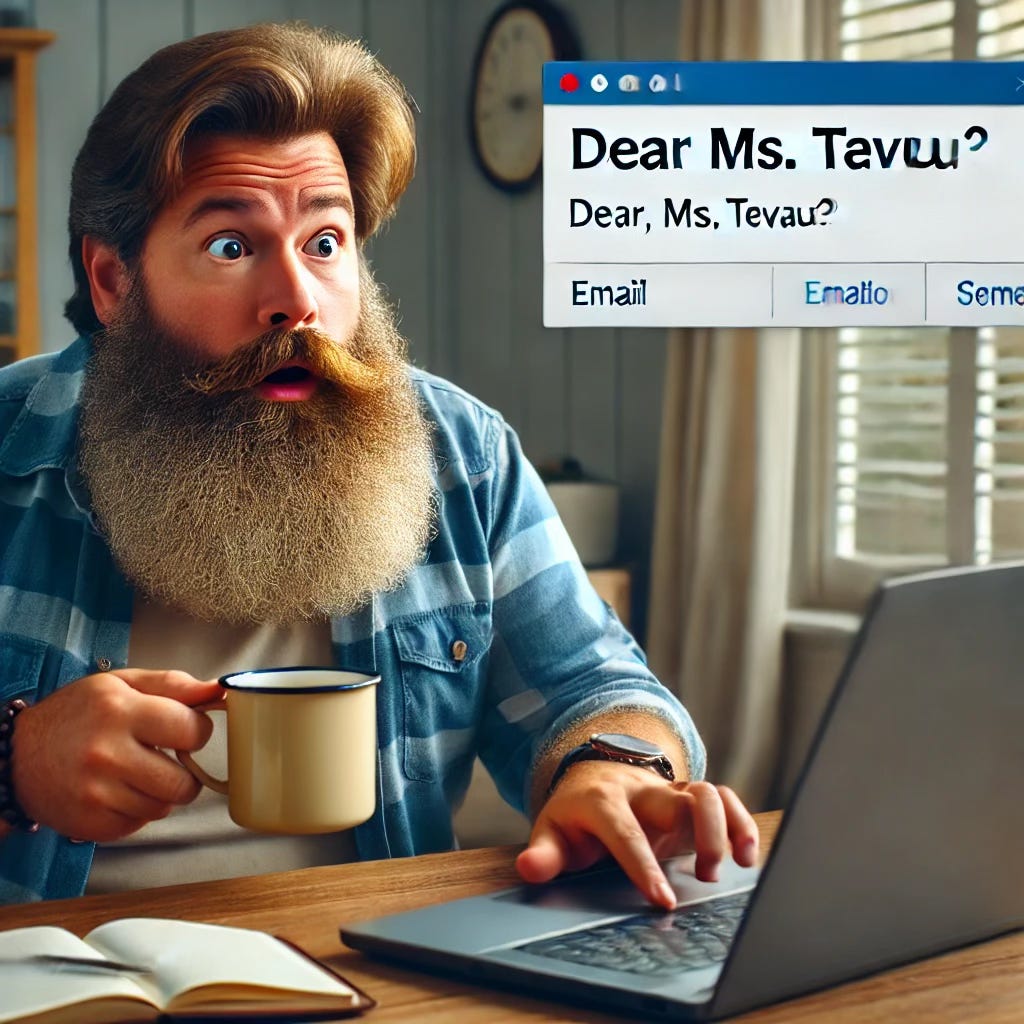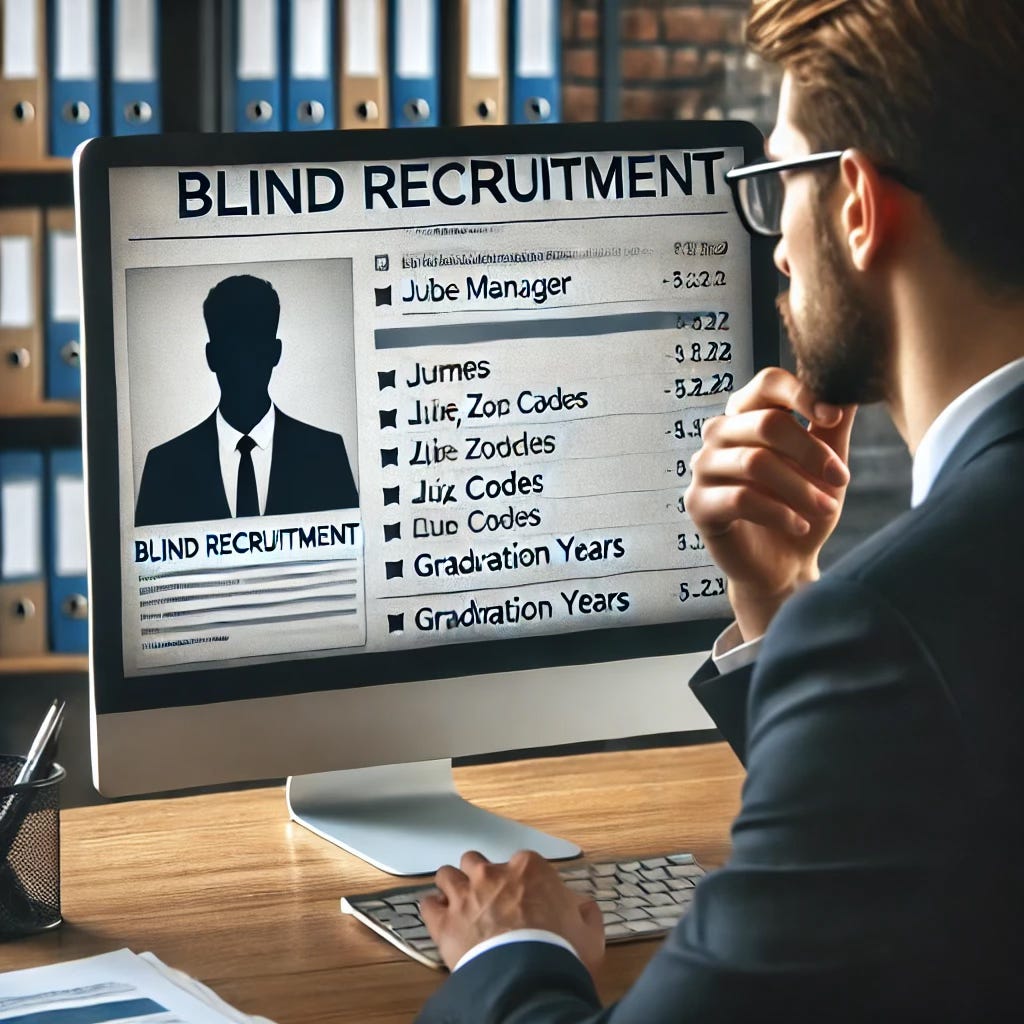It was a regular Tuesday morning, the kind where you sip your coffee, check your emails, and wonder if today is the day you'll finally make it to the gym (spoiler: it wasn't). As I scrolled through my inbox, I noticed something strange—a response to an inquiry I had made days earlier. The email began with a cheery, "Dear Ms. Taveau."
Ms.? Really? Last time I checked, I was a 50-something-year-old, slightly overweight guy with a beard that could rival a lumberjack’s and whose pronouns are He/Him. I quickly glanced in a mirror to make sure I hadn't magically transformed overnight into a woman named "Sebastienne" (which, if you think about it, is a name with a certain French flair “Je-ne-sais-quoi). Nope, still me, beard and all.
I couldn't help but laugh at the mistake. My name, Sebastien, is often mistaken for a female name, especially in written communication. This is why I usually go by “Seb” hoping people will associate it with “Ted”, just one letter off. It’s not the first time it’s happened, and it won’t be the last. But every time it does, I wonder what kind of picture people have in their heads when they read my name. Perhaps they imagine a petite woman, elegantly sipping on a cup of herbal tea, instead of a grizzled, middle-aged man grumbling about the lack of pastries at the coffee shop.
But the mix-up got me thinking—what if this wasn’t just a harmless mistake? What if my name actually influenced how people treated me, or even the opportunities I received?
When a Name Becomes More Than Just a Name
In our increasingly digital world, we often interact with others without ever seeing their faces. Names, then, become our first impression, and unfortunately, they can lead to some serious misconceptions and even discrimination.
Here's where it gets less funny:
Name Discrimination: Studies have shown that names can indeed lead to discrimination. For instance, research where identical resumes were sent out, but with names typically associated with different racial backgrounds, showed a stark difference in callback rates. Names perceived as "Black" or "ethnic" received fewer callbacks, indicating a bias in hiring practices based on perceived ethnicity or race through names alone.
Studies have shown that people with names perceived as "ethnic" or "unusual" often face bias, particularly in the job market. A study by the National Bureau of Economic Research found that job applicants with names that sounded "white" received 50% more callbacks for interviews than those with names that were perceived as "Black," despite having identical resumes. That’s a pretty staggering statistic, considering that a name is something we’re given at birth and not a reflection of our abilities or potential.
Zip Code Bias: But it’s not just names. Your zip code can sometimes determine your fate more than your qualifications. There's a growing body of evidence suggesting that where you live can affect job opportunities, educational outcomes, and even health care. This isn't just about wealth; it's about the stereotypes associated with certain areas.
People can be judged based on their zip code, which can signal socioeconomic status, or even the year they graduated, which can lead to assumptions about their age. These factors, while seemingly innocuous, can have real-world consequences.
A 2017 study published in the Harvard Business Review found that people who listed addresses in wealthier neighborhoods were more likely to receive responses from employers. Similarly, a 2019 study from ProPublica revealed that some online job platforms discriminated against older workers by targeting job ads to specific age groups, excluding those over a certain age.
Graduation Year: Age discrimination is subtle but real. A study might not directly quote this, but the sentiment on platforms like X (formerly Twitter) often highlights how mentioning your graduation year can lead to assumptions about your technological savviness or energy levels, affecting job prospects or promotions.These biases are often unconscious, but they’re deeply ingrained. It’s easy to see how they can snowball into larger issues of inequality and missed opportunities.
Turning the Tables
So, what can we do about it? The first step is awareness. We need to recognize our own biases and challenge them. If you’re a hiring manager, ask yourself if a name, address, or graduation year is truly relevant to a candidate’s qualifications. If you’re in a position of power, advocate for blind recruitment processes where possible—where names and other potentially biasing information are removed from applications. It is however important to stay cognitive of the potential drawbacks.
More importantly, we need to acknowledge the rise of AI in doing the first filtering of applications. While the idea to remove the human biais from the equation is noble, we have to keep in mind these AI HR Agents are not fully reliable. I have seen how some “non-disclose” criteria were build into the selection model. An acquaintance applied for a role she was more than qualified and from the description, she was the stellar hire. Only problem? She graduated from college in the 1990s and left the date on her resume. She didn’t pass the first round which would be a call from a recruiter. Fast forward 6 months later, the job requisition popped back and this time, she removed the dates of graduation on her resume. Guess what happened? A recruiter called her saying her experience was exactly what they were looking for and she was so happy that she applied for that role. She got the offer, accepted but she did make a point to talk to HR after her starting date to share her story. Not sure if any changes came out of it but at least, they are now aware they are missing on a lot of great candidates because they never see their applications. AI cuts them out.
As for me, I’ll keep chuckling at the thought of being called "Ms." But I’ll also keep pushing for a world where names, zip codes, and ages are just that—words and numbers that don’t define who we are or what we’re capable of achieving.
Because at the end of the day, whether I’m Sebastien or "Sebastienne," what really matters is the work I do and the person I am. Now, if you'll excuse me, I need to respond to this email and gently correct them—after all, even bearded guys need a little clarity now and then.
The infamous email:
F.W.: 2 female speakers needed
Inbox
me, Br_______ (2)
5:08 PM (2 hours ago)
to me
Hey Sebastien,
It's ——— , with *company name removed*.
I'm a female speaker in the youth market.
Right now, for female keynote speakers, the demand for event organizers is absolutely astronomical.
I got off a discovery call earlier this week where the decision maker and event planner literally said,
"We want a female keynote speaker, but we can barely find any."
The demand for women speakers is amazing and I want to create space for you and show you how to get on keynote stages and get paid to do it.
Not only is there room for you in the speaking industry, but the demand for you and your message is absolutely unreal right now.
And I want to show you how we here at *company name removed* can help you fulfill that dream and get on stage.
You are in demand, Sebastien.
Ready to turn that demand into a paid speaking gig?
We're looking for 2 female speakers ready to take action to start a reliable 6-figure speaking business.
It's time to get on stage and get paid to share your message, make an income and have an impact.
Let us show you how.
You’re awesome,
*All names removed*.
P.S. Not a female speaker? You're still in demand, and I've got a spot for you.
P.P.S. If you know a female speaker, feel free to forward them this email!









They just upped it up "F.W.: 3 female speakers needed"